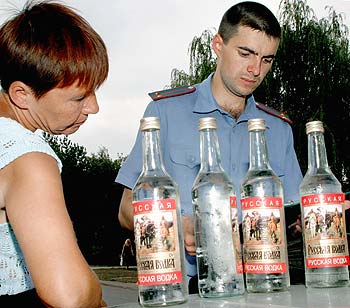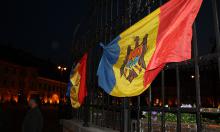Russians drink 215 million decaliters of vodka a year, 40% of it is illegal
Not only bootleggers, but also conventional distilleries manufacture illegal alcohol

Four hundred Russian distilleries use only one-third of their capacities, although they have a potential to produce over 380 million decaliters of alcohol a year. Legal manufacturers usually practice the “three-shifts” methods in their production. They make legal vodka during the first two shifts, but they switch to illegal production at night, during the third shift. Alcohol-makers introduced such practice due to the tax law. 
The proper payment of taxes would ruin a company very quickly. A bottle of vodka is available in stores for 70 rubles, which brings only two rubles of profit to a plant. It goes without saying that the illegal production of vodka is not taxable, which brings a lot more profit. As a result, distilleries annually manufacture two liters of illegal vodka per capita. The official statistics says, over 40,000 Russian people died over alcohol poisoning in 2003. This number can be compared to the population of a small town. Specialists say, though, people die of household chemical substances, technical alcohol, etc.
It goes without saying wealthy people will not drink low-quality beverages. As a rule, bad quality vodka kills poor people, who prefer to buy strong but cheap drinks. One-third of alcohol manufactured in Russia is the technical alcohol. Unlike the normal, drinkable alcohol, the technical spirit is not imposed with excises; a license is not required for its production either. Distilleries use this aspect for the production of poisonous alcohol.
Governmental officials pretend they are not informed about the situation. They either lobby the interests of vodka tycoons, or are being cynical about the issue.
Illegal alcohol-makers have become quite numerous on the Russian market. “The prime cost of alcohol is not high, it is easy to make it even under home conditions,” the head of the national alcohol association Pavel Shapkin said in an interview with the Trud. Furthermore, the simple production and huge income criminalize the alcohol business. Tax evasion is considered inconceivable in foreign countries – a person of any social status, a celebrity or a minister, can be jailed for this. The Russian government, however, still perceives it as a part of the capitalist society in a certain country. It is easier to trace the illegal alcohol production on the wholesale market, but it is impossible to detect actual sellers. They sell it with forged invoices, without taking any risks.
”The vodka excise was raised by 18.5 percent last year. It will gain eight percent more in 2005. We believe this policy will continue in the future too. If the state does not change the approach to the alcohol industry, a lot of distilleries will wrap up the illegal production and continue their activities on an illegal basis,” Pavel Shapkin said.
According to experts' estimates, the shadow alcohol market brings over 20 billion rubles of annual damage to the budget. The number is likely to grow next year.
”The illegal market of alcohol production makes up 40 or 60 percent,” Valery Draganov, the chairman of the State Duma committee for economic policy said. “The state loses a lot of money for this reason. Until recently, the government has been raising excise rates in its attempts to increase budget earnings from the alcohol market. However, since it concerns only legal manufacturers, the illegal makers obtain additional competitive advantages. In 2000, for example, the legal production decreased by ten percent, after the government raised the excise rate by 40 percent. The people did not start drinking less, though. The state is capable of establishing law and order on the alcohol market. One has to introduce tough control in retail sales and exclude a possibility to use technical alcohol in the production of illegal vodka. A workgroup from our committee has developed certain suggestions on the matter. I hope that the Duma will pass the amended law about the state regulation of the alcohol production and turnover.
Subscribe to Pravda.Ru Telegram channel, Facebook, RSS!




